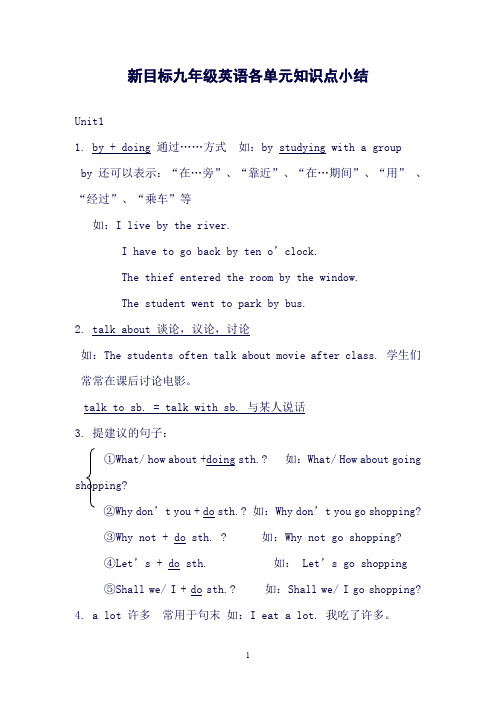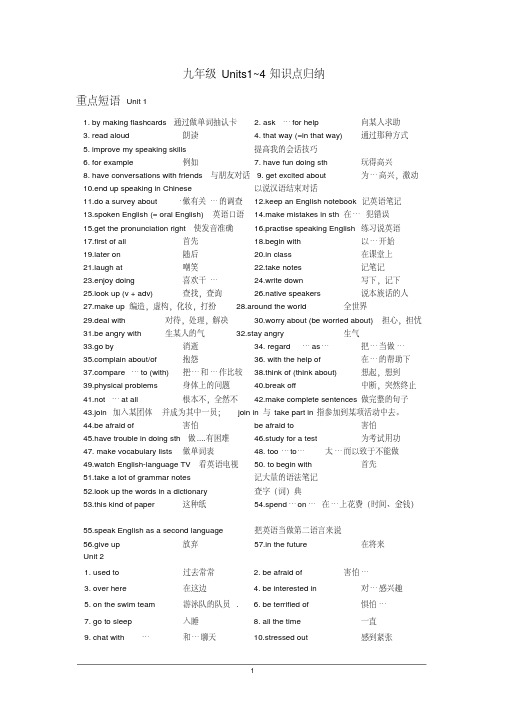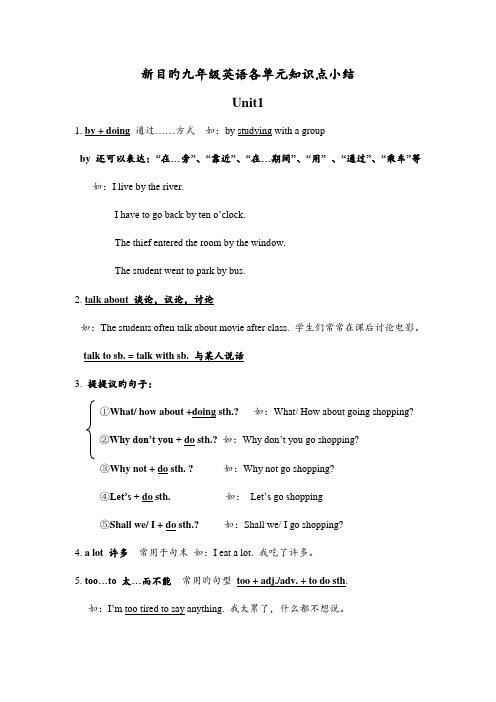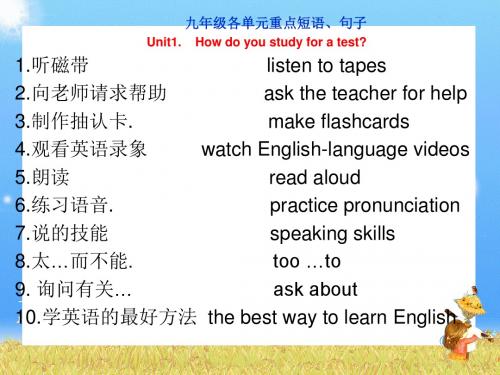新目标九年级英语单元知识点、短语及句型总结[1]
新目标九年级英语单元知识点、短语及句型总结

Unit 1一、知识点1.Check in : 在旅馆的登记入住。
Check out: 在旅馆结账离开。
2.By: ①通过…..方式(途径)。
例:I learn English by listening to tapes.②在…..旁边。
例:by the window/the door③乘坐交通工具例:by bus/car④在……之前,到……为止。
例:by October在10月前⑤被例:English is spoken by many people.3.how与what的区别:how通常对方式或程度提问,意思有:怎么样如何,通常用来做状语、表语。
what通常对动作的发出者或接受者提问,意思为什么,通常做宾语,主语。
①How is your summer holiday? It’s OK.(how表示程度做表语)②How did you travel around the world? I travel by air.③What do you learn at school? I learn English, math and many other subjects.①What…think of…? How…like…?②What…do with…? How…deal with…?③What…like about…? How…like…?④What’s the weather like today? How’s the weather today?⑤What to do? How to do it?e.g. What do you think of this book?=How do you like this book?I don’t know what I should do with the matter.=I don’t know how I should deal with it.What do you like about China?=How do you like China?I don’t know what to do next step?=I don’t know how to do it next step?㊣What good / bad weather it is today!(weather为不可数名词,其前不能加a )㊣What a fine / bad day it is today! (day为可数名词,其前要加a )4. aloud, loud与loudly的用法: 三个词都与"大声"或"响亮"有关。
新目标九年级英语各单元知识点小结(良心出品必属精品)

新目标九年级英语各单元知识点小结Unit11. by + doing 通过……方式如:by studying with a groupby 还可以表示:“在…旁”、“靠近”、“在…期间”、“用” 、“经过”、“乘车”等如:I live by the river.I have to go back by ten o’clock.The thief entered the room by the window.The student went to park by bus.2. talk about 谈论,议论,讨论如:The students often talk about movie after class. 学生们常常在课后讨论电影。
talk to sb. = talk with sb. 与某人说话3. 提建议的句子:①What/ how about +doing sth.? 如:What/ How about going shopping?②Why don’t you + do sth.? 如:Why don’t you go shopping?③Why not + do sth. ? 如:Why not go shopping?④Let’s + do sth. 如:Let’s go shopping⑤Shall we/ I + do sth.? 如:Shall we/ I go shopping?4. a lot 许多常用于句末如:I eat a lot. 我吃了许多。
5. too…to 太…而不能常用的句型 too + adj./adv. + to do sth.如:I’m too tired to say anything. 我太累了,什么都不想说。
6. aloud, loud与loudly的用法三个词都与"大声"或"响亮"有关。
①aloud是副词,重点在出声能让人听见,但声音不一定很大,常用在读书或说话上。
新目标英语九年级各单元重点语法归纳

新目标英语九年级各单元重点语法归纳Unit 1 - Present Continuous Tense- 用于描述正在发生的动作或情况- 构成:be动词(am, is, are) + 现在分词 (-ing形式)Unit 2 - Past Simple Tense- 用于描述过去发生的动作或情况- 构成:动词过去式或动词的第二形式- 用于比较两个或多个人或物的特征或性质- 构成:形容词或副词 + 比较级/最高级Unit 4 - Conditional Sentences- 用于表示条件和结果之间的关系- 构成:条件从句 (if + 现在时/过去时) + 结果从句(will/can/must + 动词原形)Unit 5 - Modal Verbs- 用于表示能力、请求、允许等- 包括 can, could, may, might, must, should, shall, will, wouldUnit 6 - Passive Voice- 用于强调动作的承受者而不是执行者- 构成:be动词(am, is, are, was, were) + 过去分词Unit 7 - Reported Speech- 用于转述别人说的话- 构成:直接引语转变为间接引语,动词时态和人称发生变化Unit 8 - Future Forms- 用于表示将来的动作或情况- 包括 will, be going to, present continuousUnit 9 - Review of Tenses- 复各种时态的用法和构成以上是新目标英语九年级各单元的重点语法归纳。
希望对您有所帮助!。
(完整版),新目标英语九年级知识点,推荐文档

九年级Units1~4知识点归纳重点短语Unit 11. by making flashcards 通过做单词抽认卡2. ask…for help 向某人求助3. read aloud 朗读4. that way (=in that way) 通过那种方式5. improve my speaking skills提高我的会话技巧6. for example例如7. have fun doing sth玩得高兴8. have conversations with friends 与朋友对话9. get excited about 为…高兴,激动10.end up speaking in Chinese 以说汉语结束对话做有关…的调查12.keep an English notebook 记英语笔记11.do a survey about… 13.spoken English (= oral English) 英语口语14.make mistakes in sth 在… 犯错误15.get the pronunciation right 使发音准确16.practise speaking English 练习说英语17.first of all 首先18.begin with 以…开始ter on 随后20.in class在课堂上ugh at 嘲笑22.take notes 记笔记23.enjoy doing 喜欢干…24.write down 写下,记下25.look up (v + adv) 查找,查询26.native speakers 说本族话的人27.make up 编造,虚构,化妆,打扮28.around the world 全世界29.deal with 对待,处理,解决30.worry about (be worried about) 担心,担忧31.be angry with 生某人的气32.stay angry 生气33.go by 消逝34. regard…as… 把…当做…plain about/of 抱怨36. with the help of在…的帮助下把…和…作比较38.think of (think about) 想起,想到pare…to (with)… 39.physical problems身体上的问题40.break off 中断,突然终止41.not…at all 根本不,全然不42.make complete sentences做完整的句子43.join 加入某团体并成为其中一员;join in与take part in指参加到某项活动中去。
2023年新目标九年级英语各单元知识点小结

新目旳九年级英语各单元知识点小结Unit11. by + doing通过……方式如:by studying with a groupby 还可以表达:“在…旁”、“靠近”、“在…期间”、“用” 、“通过”、“乘车”等如:I live by the river.I have to go back by ten o’clock.The thief entered the room by the window.The student went to park by bus.2. talk about 谈论,议论,讨论如:The students often talk about movie after class. 学生们常常在课后讨论电影。
talk to sb. = talk with sb. 与某人说话3. 提提议旳句子:①What/ how about +doing sth.? 如:What/ How about going shopping?②Why don’t you + do sth.?如:Why don’t you go shopping?③Why not + do sth. ? 如:Why not go shopping?④Let’s + do sth. 如:Let’s go shopping⑤Shall we/ I + do sth.?如:Shall we/ I go shopping?4. a lot 许多常用于句末如:I eat a lot. 我吃了许多。
5.too…to 太…而不能常用旳句型too + adj./adv. + to do sth.如:I’m too tired to say anything. 我太累了,什么都不想说。
6. aloud, loud与loudly旳使用方法三个词都与"大声"或"响亮"有关。
①aloud是副词,重点在出声能让人听见,但声音不一定很大,常用在读书或说话上。
最新九年级人教版新目标英语各单元重点短语及句型整理

最新九年级人教版新目标英语各单元重点短语及句型整理Unit 1 How can we e good learners?Practice makes perfect。
This means that the more you practice。
the better you e。
So。
come on。
everyone。
Let's work hard!Key XXX:1.What about doing something。
For example。
what about XXX?2.XXX "by" can be used to XXX。
such as "by bus" or "by plane." It can also be used to show how something is done。
such as "by studying with a group."3.The present perfect tense is formed with "have/has + past participle." For example。
"Have you ever studied with a group?"4."It's + adjective + (for someone) to do something" is a common structure。
For instance。
"It's too hard for me to XXX."5."The more you read。
the faster you'll be." This means that the more you read。
the quicker you will XXX.6."Find it + adjective + to do something" is another useful structure。
【精品】新目标九年级英语1—3单元重点短语、句型

15.How do we deal with our problem? 我们怎样处理我们的问题?
16.It is our duty to try our best to deal with each challenge in our education with the help of our teachers. 在老师的帮助下尽我们最大的努力来应对挑战是我们的责任。
11.My teacher is very impressed. 给老师留下了深刻的印象。
Unit1. How do you study for a test?
12.She had trouble making complete sentences.
她很难造出完整的句子。
13.What do you think you are doing? 你在做什么? 14.Most people speak English as a second language.
Unit2 .
I used to be afraid of the dark.
24.在过去的几年时间里 in the last few years 25.我的日常生活 my daily life/my everyday life 26.使你紧张 make you stressed out 27.加入某人. join sb 28.参加…(活动) take part in …/join in… 29.一个15岁的孩子 a 15-year-old kid/a kid of 15 years old 30.留长发 grow hair long 31.他似乎很累. He seems tired./He seems to be tired./It seems that he is tired. 32.制造许多麻烦.make lots of trouble/cause lots of trouble 33.得低分 get bad grades 34.移居到…. move to … 35.问题儿童 a problem child
新目标九年级英语各单元知识点小结

新目标九年级英语各单元知识点小结Unit11. by + doing通过……方式如:by studying with a groupby 还可以表示:“在…旁”、“靠近”、“在…期间”、“用” 、“经过”、“乘车”等如:I live by the river.I have to go back by ten o’clock.The thief entered the room by the window.The student went to park by bus.2. talk about 谈论,议论,讨论如:The students often talk about movie after class. 学生们常常在课后讨论电影。
talk to sb. = talk with sb. 与某人说话3. 提建议的句子:①What/ how about +doing sth.? 如:What/ How about going shopping?②Why don’t you + do sth.?如:Why don’t you go shopping?③Why not + do sth. ? 如:Why not go shopping?④Let’s + do sth. 如:Let’s go shopping⑤Shall we/ I + do sth.?如:Shall we/ I go shopping?4.too…to 太…而不能常用的句型too + adj./adv. + to do sth.如:I’m too tired to say anything. 我太累了,什么都不想说。
5. aloud, loud与loudly的用法三个词都与"大声"或"响亮"有关。
①aloud是副词,重点在出声能让人听见,但声音不一定很大,常用在读书或说话上。
通常放在动词之后。
- 1、下载文档前请自行甄别文档内容的完整性,平台不提供额外的编辑、内容补充、找答案等附加服务。
- 2、"仅部分预览"的文档,不可在线预览部分如存在完整性等问题,可反馈申请退款(可完整预览的文档不适用该条件!)。
- 3、如文档侵犯您的权益,请联系客服反馈,我们会尽快为您处理(人工客服工作时间:9:00-18:30)。
Fish is eaten by cats.(被动语态)鱼被猫吃。
②被动语态的构成由“助动词be +及物动词的过去分词”构成助动词be 有人称、数和时态的变化,其变化规则与be 作为连系动词时完全一样。
时态被动语态结构例句一般现在时amare +过去分词isEnglish is spoken in manycountries.一般过去时was +过去分词were + 过去分词This bridge was built in1989.情态动词can/shouldmay +be+过去分词must/……The work must be doneright now.③被动语态的用法当我们不知道谁是动作的执行者,或者没有必要指出谁是动作的执行者,或者只需强调动作的承受者时,要用被动语态。
2. allow sb. to do sth. 允许某人做某事(主动语态)如:Mother allows me to watch TV every night. 妈妈允许我每晚看电视。
be allowed to do sth. 被允许做某事(被动语态)如:LiL y is allowed to go to Qinzhou. 莉莉被允许去钦州。
3. get their ears pierced 穿耳洞让/使(别人)做某事get sth. done(过去分词)have sth. done 如:I get my car repaired. == I have my car repaired. 我让别人修好我的车I want to have my hair cut. 我要理发.4. enough 足够形容词+enough 如:beautiful enough足够漂亮enough+名词如:enough food 足够食物enough to 足够…去做…如:I have enough money to go to Beijing. 我有足够的钱去北京。
She is old enough to go to school.她够大去读书了。
5. stop doing sth. 停止做某事Please stop speaking.请停止说话。
stop to do sth. 停止下来去做某事Please stop to speak. 请停下来说话。
6. 看起来好像…sb. seem to do sth. = It seems that +从句He seems to feel very sad.It seems that he feels very sad. 他看起来好像很伤心。
7.倒装句:由so+助动词(be/do/will/have)/情态动词+主语意为:…也是一样Neither/Nor + be动词/助动词/情态动词+主语(前为否定) 表示与前面所述事实一致.She is a student. So am I.她是一个学生,我也是。
She went to school just now. So did I . 她刚才去学校了,我也是She has finished the work. So have I . 她已经完成了工作,我也完成了。
She will go to school. So will he.她将去学校,他也是。
Tom can’t swim. Neither can John.8. yet 仍然,还常用在否定句或疑问句当中可与although/though连用9. stay up 熬夜如:I often stay up until 12:00pm.我经常熬夜到12点。
10. clean up 打扫整理如:I have cleaned up the bedroom. 我已经打扫完了卧室。
11. 程度副词:always总是usually经常sometimes有时never从不如:I am always/usually/sometimes/never late for school.我总是/经常/有时/从不上学迟到。
12. 曾经做某事:Do you ever get to school late? Y es, I do. No, I don’t.Have you ever got to school late? Y es, I have. No, I haven’t.13. go shopping(去购物), go fishing(去钓鱼)go swimming(去游泳), go boating(去划船)go hiking(去登山), go trekking(去徒步)14. .be strict with+人. be strict in+事物.例: The head teacher is strict with his studentsHe is strict in the work.15. take the test 参加考试pass the test 通过考试fail a test 考试失败16. the other day前几天,不久前的一天.(用于过去时)every other day = every two days 每隔一天(每两天)17. agree 同意反义词disagree不同意动词agreement 同意反义词disagreement 不同意名词18. keep sb/ sth. +形容词使某人/某物保持….如:W e should keep our city clean.(cleanin gⅹ)我们应该保持我们的城市干净。
Don’t keep me waiting for a long time.别让我等得太久。
一、知识点虚拟语气1. if 引导的非真实性条件状语从句即虚拟语气通过动词形式的变化来表示说话人对发生的动作或存在的状态所持的态度或看法的动词形式称为语气,虚拟语气表示说话人所说的话不是事实,而是一种祝愿,建议或是与事实相反的假设等。
If 引导的条件状语从句分为真实和非真实条件句,非真实条件句应用虚拟语气。
如果要表示与现在或将来事实相反时,其虚拟语气结构为:句型条件从句主句谓语动词形式动词过去式(be动词一律用were)would+动词原形即:(从句)if +主语+动词过去式(be 动词用were), 一般过去时(主句) 主语+would+动词原形过去将来时如:If I had time, I would go for a walk.如果我有时间,我就会去散步。
(事实上我现在没有时间)If I were you, I would take an umbrella.假如我是你的话,我会带上雨伞。
(事实上我不是你)I would say no if someone asked me to be in a movie.假如有人请我当电影演员,我会表示拒绝。
(事实上瑞没有人请我当电影演员) 2. pretend to do sth. 假装做某事I pretended to sleep just now.pretend to be doing sth. 假装正在干某事The students pretended to be writing when the teacher came in.pretend +从句假装…I pretended that I fell asleep.3. be late for 迟到如:I am late for work/ school/ class/ party.4. a few 与 a little 的区别,few 与little 的区别⑪ a few 一些修饰可数名词a little 一些修饰不可数名词两者表肯定意义如:He has a few friends. 他有一些朋友。
There is a little sugar in the bottle. 在瓶子里有一些糖。
⑫few 少数的修饰可数名词little 少数的修饰不可数名词但两者表否定意义如:He has few friends. 他没有几个朋友。
There is little sugar in the bottle.在瓶子里没有多少糖。
5. hundred, thousand , million, billion (十亿)词前面有数词或several一词时要不能加s ,反之,则要加s 并与of 连用,表示数量很多如:several hundred/ thousand/ million/ billion people几百/千/百万/十亿人hundreds of trees 上百棵树8. what if + 从句如果…怎么办,要是…又怎么样如:What if she doesn’t come? 要是她不来怎么办?What if LiLei knows? 如果李雷知道了怎么办?9. add sth. to sth. 添加…到…如:I added some sugar to water. 我把糖添加到水里。
10. 系动词与形容词连用get nervous 变得紧张feel shy 觉得害羞look friendly 看起来友好11. too +形/副+to do sth. 太…而不能如:I’m too tired to stand. 我太累了而不能站。
12. help with sth. 如:They help with this problem.help sb. do. 如:They help you relax. 他们帮助你放松13. in public 在公共场所如:Don’t smoke in public. 请不要在公共场所吸烟。
14. energetic adj. 活力的如:She is a energetic girl. 她是一个活力的女孩。
energy n. 活力如:She has lots of energies. 她有活力。
15. ask sb. to do 叫…做某事ask sb. not to do sth.叫…不要做某事tell sb. to do 告诉…做某事tell sb. not to do sth. 告诉…不要做某事如:T eacher asked me to clean the classroom.Teacher asked me not to clean the classroom.16. start doing == start to do. 开始做某事如:He started speaking/ to speak. 他开始说话。
17. borrow sth. from sb. 从某人那里借来某物如:I borrowed a book from Lily. 我从莉莉那里借来一本书。
